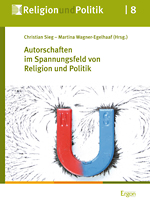The contributions to this volume analyze the intertextual and social contexts of authorship. Along these lines, authorship is conceptualized not as origin but as effect of literary works. The chapters show how authorship is generated between the conflicting poles of religion and politics. As various literary works exemplify: religious and political semantics legitimate authorship from antiquity to modernity. The contributions focus on literature of the 20th and 21st century and ask if and how we can differentiate between religious and political aspects of authorship.
After an introduction by the editors, Christian SiegβÄôs contribution draws attention to the immediate postwar era where political authorship draws on the critique of religion and the provocative identification with nihilism. Subsequently, Philipp Pabst shows how in the 1950s the very attempt to criminalize Arno SchmidtβÄôs literary texts as blasphemy urged the author to adopt a model of authorship which aimed at the provocation of religious and political conservatives. In his contribution, Christoph Pflaumbaum points to a text by Wolfgang Hildesheimer which at the peak of the student revolution in 1968 turns away from politics to religion and uses religious exercises as a medium to reflect authorship. Martina Wagner-Egelhaaf analyzes the religious dimension of Peter HandkeβÄôs texts on Yugoslavia which created political scandals in the 1990s. Matthias Schaffrick then shows how an essay by Carl Schmitt helps to understand Martin MosebachβÄôs authorship. In particular, MosebachβÄôs novel Das Beben (2005) discusses political theology. Innokentij Kreknin reads Christian KrachtβÄôs novels as instances of aesthetic fundamentalism which determines his authorship as well. Kracht, the contribution argues, constructs the author as an aesthetic object and thereby detaches him from the political realm.
The last two contributions widen the focus of the volume and take British as well as American authors into account. Florian KlΟΛger scrutinizes the ways in which Martin Amis comments on the return of religion after 9/11. Amis, he argues, pits the dialogic nature of the novel against religious fundamentalism. Anna Thiemann finally reads Jonathan FranzenβÄôs novels The Corrections (2001) and Freedom (2010) against the backdrop of the American civil religion (Robert Bellah) and shows how the tensions between politics and religion unfold in these works.
LIterature: Sieg, Christian, and Martina Wagner-Egelhaaf (eds.): Autorschaften im Spannungsfeld von Religion und Politik (Religion und Politik, vol. 8), WΟΦrzburg: Ergon 2014 (with contributions from Matthias Schaffrick, Christian Sieg, and Martina Wagner-Egelhaaf).


